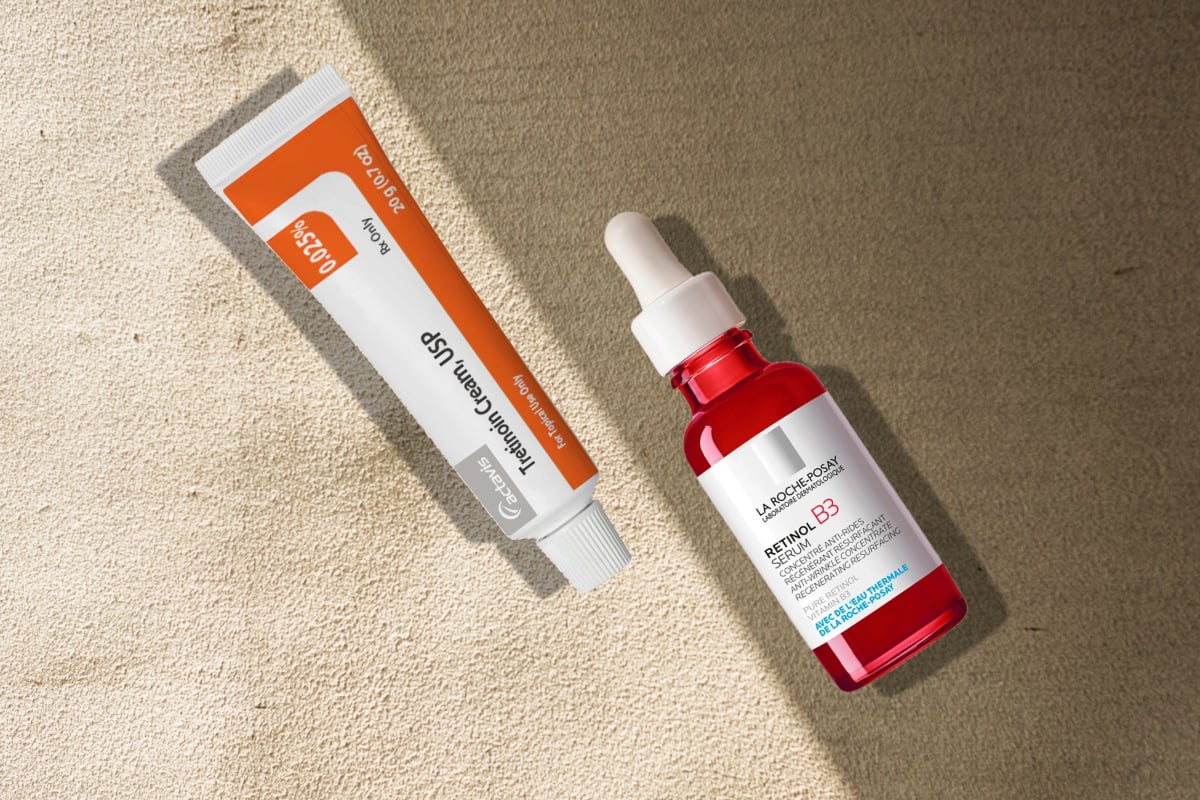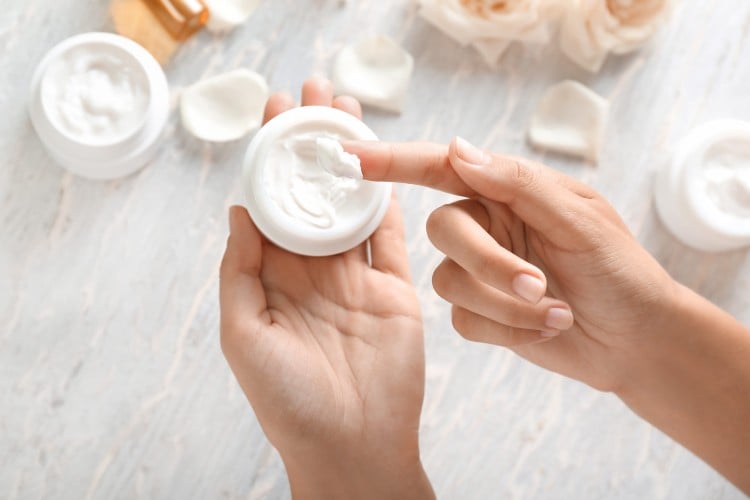If you’re a beauty enthusiast, chances are you’ve come across the buzz around antioxidants in your skincare routine. And while you’ve tried your fair share of antioxidant-rich products, have you heard of resveratrol? This little gem is found in certain foods, and yes, it’s hiding even in your favorite glass of red wine. But resveratrol isn’t just a run-of-the-mill ingredient for wine lovers—it’s a skincare powerhouse that offers numerous benefits for your skin. In this article, we share everything you need to know about resveratrol. So sit back, pour yourself a glass of that beloved vino (after all, we’re talking about resveratrol here), and get ready to discover this miracle molecule that your skin needs to stay young.
What is resveratrol?
Resveratrol is a natural antioxidant found in a variety of tasty treats like grapes, berries, peanuts, and even dark chocolate. It’s a member of the polyphenolic family, which is the group of compounds with the richest sources of antioxidants found in nature.[1][2] And guess what? Resveratrol is good at getting under your skin, quite literally!
Since it’s fat-soluble and has a tiny molecular weight, resveratrol sneaks through your skin barrier and gets into your skin when you apply it, bringing all its good properties where they matter most. Plus, it’s easily metabolized by humans and your body knows what to do with it.
Skincare benefits
In the context of skincare, resveratrol is best known for its ability to neutralize skin-damaging free radicals, but there is more resveratrol can do for your skin. Here we take a closer look at these benefits.
Supports healthy aging
Resveratrol supports healthy skin aging by scavenging free radicals. These harmful molecules, found in sources like UV and pollution, break down the body’s DNA, which affects the skin’s integrity and causes it to age faster. Moreover, resveratrol goes the extra mile and supports the production of collagen and elastin, proteins that make your skin firm and elastic.[3]
Anti-inflammatory
Resveratrol is an effective solution for acne and eczema. By targeting the underlying inflammation that contributes to these conditions, resveratrol soothes and calms the skin, reducing redness and swelling.
Treats skin discoloration
Do dark patches or post-acne blemishes not let you enjoy even-toned skin? Resveratrol might be just what you need to achieve a bright complexion. Not only does it protect against sun-induced discoloration due to its ability to neutralize free radicals, but it is also an inhibitor of pigment-producing cells.
Are you familiar with melanin? It’s the body’s natural defense system against sun damage. But here’s the thing: too much sun exposure can throw this system off balance and cause an excess of pigment in cells that leads to hyperpigmentation. Resveratrol goes straight to the source of dark spots by putting a break to melanin. It does that by reducing the activity of tyrosinase, the enzyme behind skin-darkening pigment production.[4]
One study comparing the effects of various skin-lightening agents, including hydroquinone, vitamin C, and arbutin, found that resveratrol is the most potent tyrosinase inhibitor.[5] When participants applied a 1% resveratrol twice a day for eight weeks, the results were nothing short of impressive—significant brightening effects without irritation.
Repairs cells
Resveratrol can activate sirtuins, a group of proteins involved in various cellular processes, including aging and longevity. Sirtuins activation by resveratrol has been found to promote cellular repair and rejuvenation, enhance antioxidant defenses, and improve energy production in our cells.[6] However, more studies are needed to fully understand the extent of its effects and how they translate to specific skincare benefits.
Oral vs. topical resveratrol
When it comes to enjoying the skincare benefits of resveratrol, you have two choices: take it as a supplement or apply it directly to your skin.
Studies have shown that oral resveratrol can activate sirtuins—these cool proteins that play a role in aging and longevity. It also has antioxidant and anti-inflammatory properties, which are great for overall well-being. On the other hand, topical application has more targeted effects on the skin, reducing oxidative stress, protecting against UV damage, reducing hyperpigmentation, and stimulating collagen production. Plus, it can also provide more immediate benefits like brightening and smoothing.
How to use resveratrol
You can use resveratrol-infused products before bed or in the morning. However, we recommend using it in your nighttime routine to allow it to work with the skin’s repairing process that takes place at night. Start by washing your face with a gentle cleanser to create a clean canvas, apply resveratrol serum, and follow with a hydrating moisturizer. Here’s some good news: you can use resveratrol with most actives in skincare, including retinol, vitamin C, salicylic acid, and glycolic acid.
Use resveratrol with vitamin C for antioxidant protection
Resveratrol and vitamin C are some of the best combos for your skin. When these two antioxidants meet in your routine, they work in tandem to scavenge free radicals, firm the skin and brighten dark patches. It’s best to use your resveratrol serum in your nighttime routine since it’s light-sensitive and vitamin C serum in the morning. By using vitamin C in the AM and resveratrol in the PM, you’ll be giving yourself round-the-clock protection from everything from sun damage to blemishes.
Use resveratrol with glycolic acid for hyperpigmentation
The combination of resveratrol and glycolic acid was shown to result in a more effective treatment for hyperpigmentation.[7] It turns out resveratrol reduces the production of new melanin while glycolic acid removes the skin cells that have accumulated melanin. This combination was found to decrease the pigment level and minimize discoloration by 32% in 8 weeks.
Use resveratrol with retinol for wrinkles
Using retinol with resveratrol is one of the most effective wrinkle treatments because they both promote collagen production. By using resveratrol one night and retinol the next, you create a 24-hour cycle that balances protection and restoration. Think of your skin like a garden. Retinol, which you use one night, is like planting new seeds—it creates fresh, new skin cells. Resveratrol, which you use the next night, is like nurturing the garden—it heals the skin and protects it from external aggressors.
Side effects
Resveratrol is a safe and gentle ingredient in skincare products. However, ask your dermatologist before making resveratrol a part of your skincare routine if you’re pregnant, breastfeeding, or have extremely sensitive skin.
Other concerns
Resveratrol is an unstable molecule that oxidizes quickly when it comes into contact with sunlight and heat. We recommend opting for products that come in opaque packaging to minimize exposure to light and preserve the stability and effectiveness of resveratrol for longer.
Additionally, store resveratrol in a dark place where light can’t reach. When using resveratrol during the day, make sure to wear a broad-spectrum sunscreen to shield it from UV so it doesn’t lose potency.
Does resveratrol in red wine improve skin?
While sipping on a glass of red wine can be a delightful experience, relying on it for skincare benefits is not the best idea. Sure, red wine contains a smidge of resveratrol, but let’s put things into perspective.
The concentration of resveratrol in red wine is relatively low. Red wines, specifically Pinot noir from France, typically contain 0.361-1.972 mg of resveratrol per liter.[8] To hit that reference dose of 500mg of resveratrol, you’d need to drink a lot of wine. We’re talking about downing anywhere from 100 to 1000 glasses per day. It’s a scene straight out of a wine lover’s wildest dreams, but definitely not the healthiest approach.
For more targeted skincare effects, consider exploring topical products or dietary supplements specifically formulated with concentrated and bioavailable forms of resveratrol. Here’s what we recommend.
References
Women’s Concepts uses reliable sources, including dermatologists’ insights, clinical trials, and scientific journals, to find accurate information and support all the facts shared in our articles. All statements and claims have clear and legit references. Read our editorial policy to learn more about our sources of information, our process of researching and fact-checking the content, and how our team strives to keep all articles updated, completed, and trustworthy.
- Ratz-Łyko A, Arct J. Resveratrol as an active ingredient for cosmetic and dermatological applications: a review. J Cosmet Laser Ther. 2019;21(2):84-90. doi: 10.1080/14764172.2018.1469767. Epub 2018 May 8. PMID: 29737899.
- Oregon State University, Micronutrient Information Center, Resveratrol
- Leis K, Pisanko K, Jundziłł A, Mazur E, Mêcińska-Jundziłł K, Witmanowski H. Resveratrol as a factor preventing skin aging and affecting its regeneration. Postepy Dermatol Alergol. 2022 Jun;39(3):439-445. doi: 10.5114/ada.2022.117547. Epub 2022 Jul 15. PMID: 35950117; PMCID: PMC9326919.
- Boo YC. Human Skin Lightening Efficacy of Resveratrol and Its Analogs: From in Vitro Studies to Cosmetic Applications. Antioxidants (Basel). 2019 Aug 22;8(9):332. doi: 10.3390/antiox8090332. PMID: 31443469; PMCID: PMC6770230.
- Na JI, Shin JW, Choi HR, Kwon SH, Park KC. Resveratrol as a Multifunctional Topical Hypopigmenting Agent. Int J Mol Sci. 2019 Feb 22;20(4):956. doi: 10.3390/ijms20040956. PMID: 30813264; PMCID: PMC6412432.
- Mohar DS, Malik S. The Sirtuin System: The Holy Grail of Resveratrol? J Clin Exp Cardiolog. 2012 Nov;3(11):216. doi: 10.4172/2155-9880.1000216. PMID: 23560248; PMCID: PMC3613783.
- Jo DJ, Seok JK, Kim SY, Park W, Baek JH, Kim YM, Boo YC. Human skin-depigmenting effects of resveratryl triglycolate, a hybrid compound of resveratrol and glycolic acid. Int J Cosmet Sci. 2018 Apr 16. doi: 10.1111/ics.12458. Epub ahead of print. PMID: 29663438.
- Weiskirchen S, Weiskirchen R. Resveratrol: How Much Wine Do You Have to Drink to Stay Healthy? Adv Nutr. 2016 Jul 15;7(4):706-18. doi: 10.3945/an.115.011627. PMID: 27422505; PMCID: PMC4942868.





